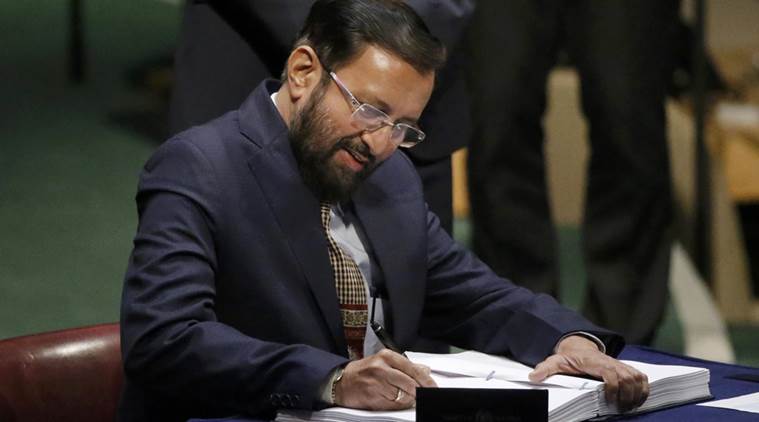New Delhi | May 16, 2016:

In an interview with The Indian Express, Javadekar said the government will make amendments to laws “as and when necessary” but stressed that there was no plan to make any substantial changes to these laws “at present”.
THE GOVERNMENT has no intention to make wholesale changes in existing environmental laws, Environment Minister Prakash Javadekar said Sunday, suggesting that it had shelved the two-year-old process to amend six major green laws with the objective of bringing them ‘in line with current requirements”.
In an interview with The Indian Express, Javadekar said the government will make amendments to laws “as and when necessary” but stressed that there was no plan to make any substantial changes to these laws “at present”. “At present, we are (in the process of) creating CAMPA law and then, next in line, is Civil Penalties law. Not any other,” he said.
The CAMPA law is a reference to the pending Bill that seeks to create Compensatory Afforestation Management and Planning Authority to deal with the money generated as compensation for diversion of forests for industrial or infrastructure projects. The Civil Penalties law refers to a proposed legislation, still being discussed by various ministries, that will introduce tougher penalties for violators of environmental norms.
Javadekar replied in the negative to questions whether the six laws would be amended, as had been announced earlier, or whether the existing legal structure of environmental governance would be altered. He also ruled out a ‘Go/No-Go’ kind of classification of forest areas that the previous UPA government had tried introducing, and a revised version of which was said to be under consideration of the present government.
The Javadekar-led Environment Ministry had, in August 2014, appointed a four-member committee headed by former Cabinet Secretary T S R Subramanian to assess the implementation of environmental laws and to recommend and draft specific amendments to bring them in line with current requirements. The Environment (Protection) Act of 1986, the Forest (Conservation) Act of 1980, and the Indian Forests Act of 1927 were among those that were sought to be reviewed.
The Subramanian committee had submitted its report in November, suggesting an overhaul of existing environmental governance framework. It had recommended measures that would ensure faster environmental clearances to projects but stronger compliance to laws and standards. The report had been criticised by activists and opposition parties.
Javadekar has often described the Subramanian report only as “one of the inputs” in making changes to environmental laws, while seeking opinions and suggestions of other stakeholders as well. Last year, the ministry had appointed a technical consultant and a law firm to finalise amendments to these laws.
Javadekar said Sunday that these were attempts at “studying” and seeking opinion. “See, I am not afraid of studying anything. I am not afraid of listening (to anyone). I am not afraid of talking or debating anything. We (the government) will prove that we are the most (concerned) about conserving nature, and we will ensure sustainable progress,” he said.
He said he was working towards achieving two objectives: a “strong compliance regime, through rigorous laws, through new technologies, through motivation, and by putting institutional mechanisms in place”, and “to build capacities into local government bodies”.
“We want to improve compliance (to environmental laws and standards) which is today at absolutely abysmal levels. And building capacities and institutional mechanisms is my second priority. To improve compliance also, we need to build capacities,” he said.
The Civil Penalties law, he said, was part of the effort to improve compliance.
Javadekar said he was confident that he will be able to convince opposition members to support the CAMPA Bill in the Rajya Sabha in the next Parliamentary session. Congress has demanded some changes in the present Bill. Javadekar said establishing CAMPA was one of the most crucial steps in forest management.
“We have to preserve forests. We cannot allow unnecessary activities in forests. Probably, only if you find uranium (a nuclear fuel) at a certain place (inside forest), you would be forced to disturb (forests). But (otherwise) you have to preserve all dense forests. And that is the policy of this government,” he said.
But the minister said there was no plan to demarcate ‘Go/No-Go’ areas as was done a few years ago to keep certain forest areas completely out of bounds for any mining, industrial or infrastructure activities. “That is not our decision. But we are already mapping the nature of forests, density and quality of forests on all criteria. And we are arriving at marks. Scorecard of forest areas at 1000 square metre blocks are being prepared. That will help us in managing activities in these areas,” Javadekar said.
(Source: http://indianexpress.com/)